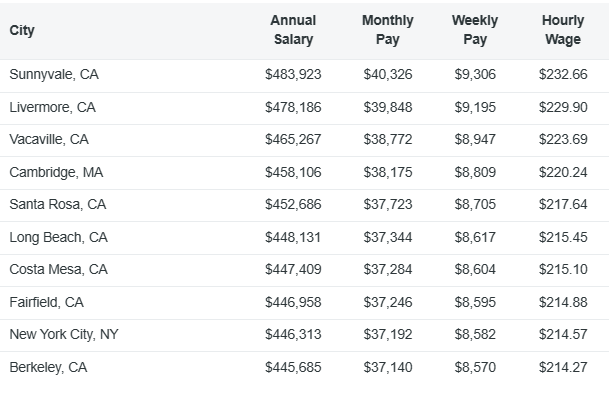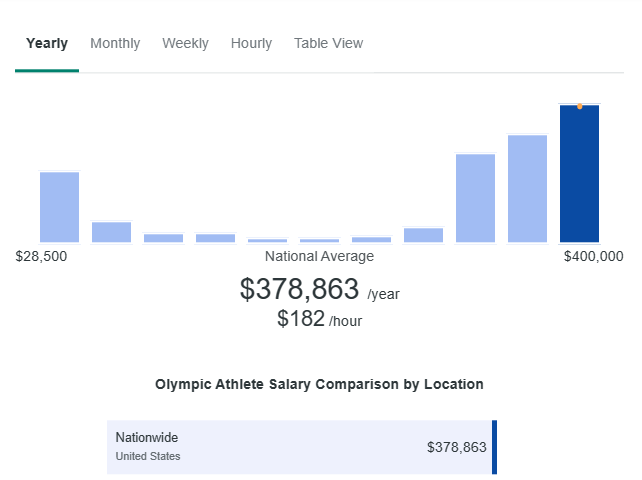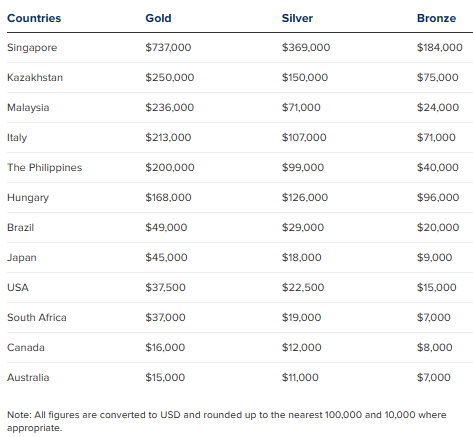Olympic Athletes Low Pay Surprises People
Explore the issue of Olympic athletes low pay, medal rewards, and financial struggles in our comprehensive analysis.
Author:Xander OddityReviewer:Dr. Felix ChaosphereMar 08, 20241.1K Shares23.9K Views

Since the inception of the Olympic Games in the 8th century B.C., the world has celebrated Olympians for their talent, skills, and determination. However, a recent TikTok video revealing Olympic athletes low payhas ignited a debate on social media.
Social Media Reveals Olympic Athletes Low Pay
A TikToker by the handle @howmuchthough shared this eye-opening information with his 196k followers.
He stated that in the Tokyo Olympics, "the US rewarded each gold medal athlete with a staggering $37,500 reward. Silver medalists would receive $22,500 and while Bronze medalists got $15,000."
In contrast, countries "expected to get fewer medals" can afford to pay more. The TikToker pointed out that "Hong Kong [is] paying gold medalists $644,000 each." Yet, he went on to reveal that in the UK, "We pay our medalists a mind-boggling, groundbreaking, truly crazy perhaps inspirational sum of $0."
Apart from medals, making a living as an Olympic athlete can be "pretty tough," he said. "Obviously the likes of Usain Bolt have no issues. He was making over $30 million a year at his peak, but for less well-known athletes, it can be a struggle."
Some countries provide a stipend to cover expenses, as "Great Britain [is] paying some athletes around $36,000 a year."
Even sponsorships don't guarantee financial security.
“„If you're not in the limelight, you'd be lucky to make over $10,000 a year from these.- Tiktoker @howmuchthough
“„The sad truth is if you're in a sport such as archery or speed skating, and you haven't won an Olympic medal yet, you're probably going to have to get another job to fund your Olympic dreams.- Tiktoker @howmuchthough
The video has clocked up more than 920.2k views and sparked varied reactions. One TikTok user wrote, "37k is lowkey crazy low...," while another said, "Imagine training 4 years for $37k."
A third sympathized:
“„It's crazy how you can be one of the best in your sport but you get nothing for it, just sad tbh.- Tiktok Comment
Others argued that the situation isn't as dire as it seems. "Olympic athletes make most of their moneywith brand deals and sponsorships," one user noted. "Yeah but the sponsors are actually so high," echoed another.
Meanwhile, some commenters weren't fazed by the numbers, with one stating:
“„Wouldn't mind it at all going around the world all expenses paid doing what I love!- Tiktok Comment
Another opined, "[They] do it for national pride not for money," while a final TikTok user praised, "We don't offer monetary incentive yet we get so many winners. Amazing."
This revelation has certainly sparked a conversation about the value we place on Olympic talent and success. Is it enough to be celebrated for your skills, or should there be a more substantial financial reward for athletes who dedicate their lives to the pursuit of Olympic gold? The debate continues.
This TikTok revelation is not an isolated incident but part of a broader, ongoing issue. It aligns alarmingly well with a survey from February 2020 conducted by the athletes' rights group GlobalAthlete.
Survey Sheds Further Light On Athletes' Financial Struggles
In a revealing study conducted in 2020 by Global Athlete, a group advocating for athletes' rights, nearly 500 top-tier athletes from 48 different countries expressed financial concerns that resonate deeply with the general populace.
An eye-opening 58% declared they weren't financially stable, and most felt under-compensated by organizations like the International Olympic Committee and their respective national federations.
The athletes didn't hold back in their individual comments either. Many lamented the lack of a pension plan, the struggle to secure funds for training, and the pressure of having their livelihood depend on how well they perform in infrequent major championships.
These survey findings dovetail with the recent social media buzz around athletes' earnings, including a TikTok video that has raised questions about the fairness of Olympic sponsorships and stipends.
The survey emphasized that a significant majority of athletes wish for greater control over their personal branding, especially during the Olympics—a topic that TikTok also touched on.
According to the survey, four out of five athletes argue for the freedom to capitalize on their own image during the Olympic Games.
While individual anecdotes and surveys offer a vivid snapshot of athletes' financial struggles, it's also valuable to consider the broader economic landscape. Recent data as of August 2023 helps us delve deeper into the average earnings of an Olympic athlete.
August 2023 Financial Update For US Olympic Athletes
The recent figures for August 2023 say an Olympic athlete in the United States earns an average of about $378,863 per year. Broken down, that's nearly $182 per hour or approximately $31,571 a month.
Interestingly, while some athletes can earn up to $400,000 annually, many others are earning as little as $28,500 a year. The gap is startling, but what's more surprising is the stagnation in salary; most athletes find little opportunity for financial growth, irrespective of their years of dedication and practice.
The job market for Olympic athletes isn't booming either, which makes the financial stability even more precarious. The latest statistics show that the salaries of Olympic athletes vary minimally across different U.S. states, confirming the limited avenues for better pay.
While these numbers can make for startling reading, especially when considering the costs of training, travel, and other professional expenses, it's also critical to remember that these figures often don't come with the job security, health benefits, and retirement plans typical in other careers.
Beijing Olympics 2022 Vs. US Athlete Rewards
As of August 2023, the financial reality for American Olympic athletes remains precarious, with many struggling to secure stable income. While the average salary for an Olympic athlete in the United States stands at around $378,863 per year, this is far from a universal experience. Many athletes earn as little as $28,500 annually, revealing a wide financial gap among competitors.
Let's take a closer look at how the United States compares with other countries, particularly in terms of monetary rewards for winning medals. This topic gained renewed attention during the Beijing Olympics in 2022.
For context, the International Olympic Committee (IOC) does not provide monetary rewards to medalists. However, individual countries often step in to incentivize their athletes with cash prizes.
Global Comparison Of Monetary Rewards For Medalists
In the United States, the Olympic and Paralympic Committee rewards its athletes with $37,500 for a gold medal, $22,500 for a silver, and $15,000 for a bronze. These amounts are generally not taxable unless an athlete's gross income exceeds $1 million.
Apart from this, American athletes receive health insurance, access to top-tier medical facilities, and even college tuition assistance. This was highlighted during the 2022 Beijing Olympics where Team USA won a total of 7 gold, 6 silver, and 3 bronze medals.
In contrast, some countries offer substantially larger financial rewards for medal-winning performances. Singapore leads the pack, rewarding their gold medalists nearly 20 times more than the United States does.
- A first-time gold medalist for Singapore could walk away with 1 million Singapore dollars, equivalent to about $737,000.
- Kazakhstan, Italy, and the Philippines also offer significant sums, ranging from $200,000 to $250,000 for a gold medal.
- Even territories like Hong Kong offer upwards of $641,000 for a gold win.
Is There An American Advantage For Endorsement And Sponsorship?
While the U.S. might seem less generous in terms of immediate cash rewards for medals, it's worth noting that the American market offers substantial opportunities for athlete endorsements and sponsorships. Only a handful of athletes globally land multimillion-dollar deals, and many of them are Americans.
For instance, snowboarder Shaun White reportedly made an estimated $10 million a year in sponsorships after his first Olympic gold in 2006. Swimmer Katie Ledecky and gymnast Simone Biles also secured millions in endorsements ahead of the summer games. Tennis star Naomi Osaka, although not an Olympic sport-specific athlete, reportedly made $55 million from endorsements in just 12 months.
In contrast, most Team USA athletes are not represented by sports agents and may not have any sponsors or endorsements, adding another layer of financial uncertainty. This discrepancy reveals the disparity not just among different countries but also among athletes within Team USA itself.
Additional Financial Strains
Earning a spot on the Olympics team is not easy, and athletes must dedicate most of their time to rigorous training. This makes it difficult for them to hold down full-time employment. Furthermore, the cost of equipment, coaching, and access to training venues can add up quickly.
While athletes from more affluent countries may receive stipends or training grants, others resort to crowdsourcing or take up a variety of jobs to finance their Olympic dreams.
Overall, while the United States provides various types of support for its athletes, from health insurance to tuition assistance, it significantly lags behind in immediate cash incentives for Olympic medals.
However, the American market does offer lucrative endorsement and sponsorship opportunities for those who manage to capture the spotlight. The financial realities for Olympic athletes are complex and multi-faceted, varying significantly not just from country to country but from athlete to athlete.
FAQs On Olympic Athletes Low Pay
Why Are Olympic Athletes Underpaid?
Olympic athletes often face limited funding from national sports organizations, which impacts their salary. The lack of consistent sponsorship opportunities also contributes to their low earnings.
What Are The Challenges For Olympic Athletes With Low Income?
Many athletes struggle to cover the costs of training, equipment, and travel. Their low income may also make it difficult to focus solely on their sports career, often requiring them to work additional jobs.
How Do Low Wages Affect Olympic Sportspeople?
Low wages often result in financial instability, leading athletes to seek alternative forms of income. This can have a negative impact on their performance and career longevity.
Is Financial Struggle Common Among Olympic Competitors?
Yes, financial struggles are common, especially for athletes in less popular sports who may not attract big sponsorships or media attention.
What Are The Economic Implications For Underfunded Olympic Athletes?
The economic challenges can lead to mental stress, poor performance, and even early retirement from the sport due to financial constraints.
Are There Solutions For Olympic Athletes' Low Pay?
Some solutions include increased funding from national sports organizations, more equitable distribution of sponsorship deals, and additional financial support such as stipends or grants.
Why Don't All Olympic Athletes Get Sponsorships?
Securing a sponsorship depends on several factors including the athlete's performance, the popularity of the sport, and marketability. Many athletes in less popular sports find it difficult to get sponsorship deals.
What Are The Typical Sources Of Income For Olympic Athletes?
Apart from salaries and sponsorships, athletes may receive income from prize money, grants, and in some cases, crowd-funding or donations.
How Do Other Countries Handle Olympic Athlete Compensation?
Countries vary widely in how they compensate their athletes, with some nations offering substantial rewards for medals, while others focus on stipends, training facilities, or educational opportunities instead.
Conclusion
In conclusion, the issue of Olympic athletes' low pay is a complex and multifaceted problem that transcends national boundaries. While the glory and prestige of representing one's country on the world stage is undoubtedly rewarding, the financial challenges many athletes face are often overlooked. From the limited funding by national sports organizations to the scarcity of sponsorship opportunities, athletes navigate a precarious economic landscape.
The disparity in rewards for medal winners between countries further highlights the inconsistencies and inequalities inherent in the system. Ultimately, a more holistic and equitable approach to supporting these dedicated individuals is needed to address the ongoing challenges associated with Olympic athletes' low pay.

Xander Oddity
Author
Xander Oddity, an eccentric and intrepid news reporter, is a master of unearthing the strange and bizarre. With an insatiable curiosity for the unconventional, Xander ventures into the depths of the unknown, fearlessly pursuing stories that defy conventional explanation. Armed with a vast reservoir of knowledge and experience in the realm of conspiracies, Xander is a seasoned investigator of the extraordinary.
Throughout his illustrious career, Xander has built a reputation for delving into the shadows of secrecy and unraveling the enigmatic. With an unyielding determination and an unwavering belief in the power of the bizarre, Xander strives to shed light on the unexplained and challenge the boundaries of conventional wisdom. In his pursuit of the truth, Xander continues to inspire others to question the world around them and embrace the unexpected.

Dr. Felix Chaosphere
Reviewer
Dr. Felix Chaosphere, a renowned and eccentric psychiatrist, is a master of unraveling the complexities of the human mind. With his wild and untamed hair, he embodies the essence of a brilliant but unconventional thinker. As a sexologist, he fearlessly delves into the depths of human desire and intimacy, unearthing hidden truths and challenging societal norms.
Beyond his professional expertise, Dr. Chaosphere is also a celebrated author, renowned for his provocative and thought-provoking literary works. His written words mirror the enigmatic nature of his persona, inviting readers to explore the labyrinthine corridors of the human psyche.
With his indomitable spirit and insatiable curiosity, Dr. Chaosphere continues to push boundaries, challenging society's preconceived notions and inspiring others to embrace their own inner tumult.
Latest Articles
Popular Articles



